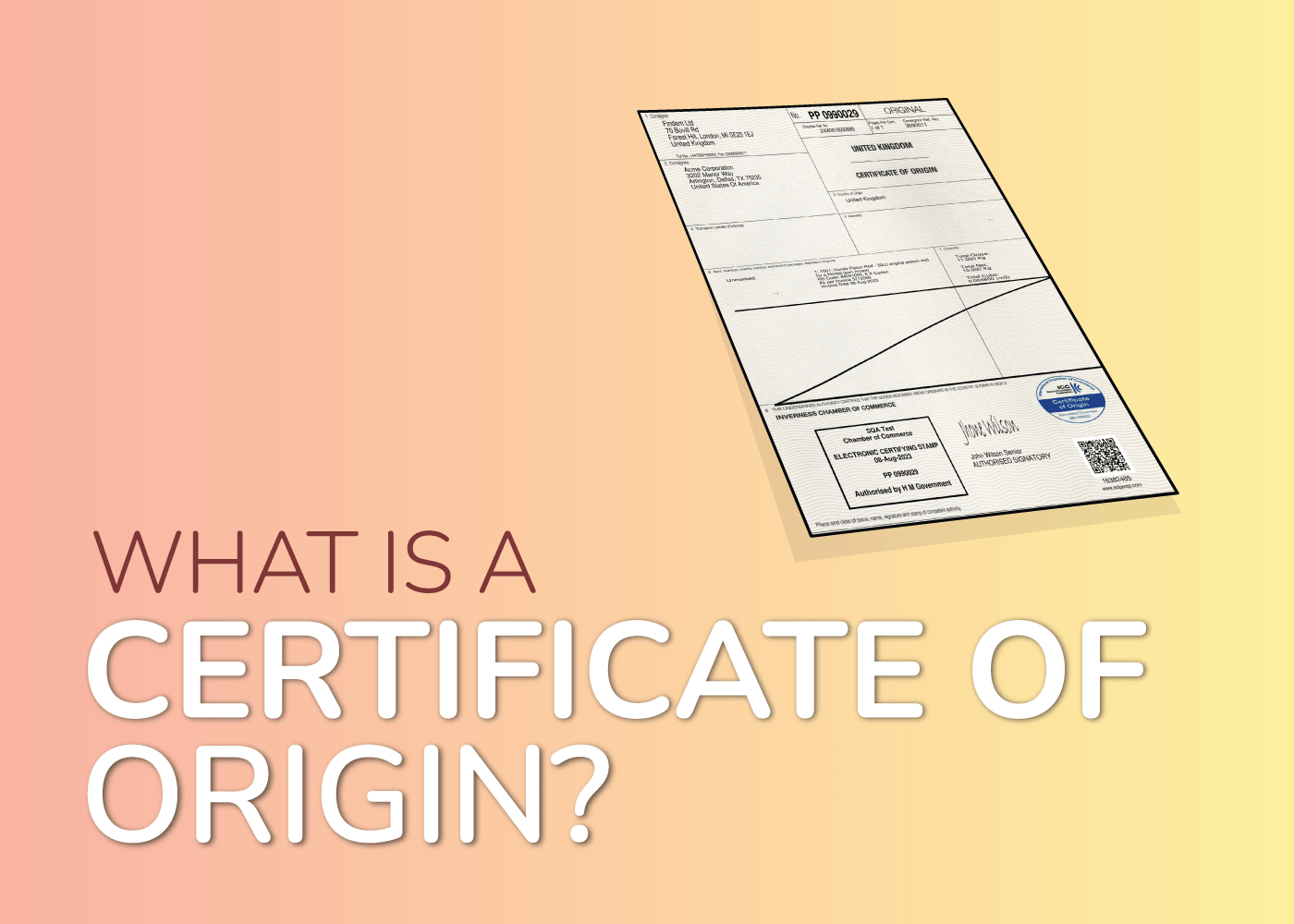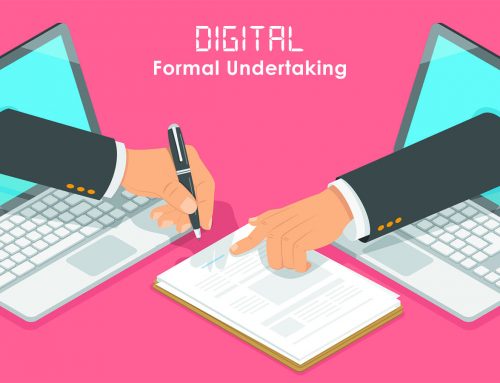A Certificate of Origin (CO) is a document usually used in supporting the exporting of goods to overseas destinations and provides evidence of the “economic origin” of the product(s) being supplied. You’ll need a Certificate of Origin (paper document) when you are trading goods internationally and your overseas buyer needs proof of the ‘country/region’ from where the goods you’re supplying have ‘originated’. Certificates of Origin give entitlement for goods to be branded with “Made In (country/region)” markings.
Related topics at the bottom of this posting provide practical step-by-step ‘How to’ guides on the certificate of origin.
Sample EC Certificate of Origin:

When is a Certificate of Origin Required?
Before just assuming you’ll need a Certificate of Origin because your goods are being sent overseas, pause for a moment and check with your buyer, and their Customs Authorities, if they actually require a Certificate of Origin. If they do need a Certificate of Origin, then proceed and get one, otherwise, just proceed WITHOUT one, which will save you both time and money. Mostly, buyers and destination countries request certificates of origin to establish ‘trust’ in the quality of the goods being introduced into their jurisdiction, along with economic and political reasons.
Where can I get a Certificate of Origin?
All countries and trading regions (like the European Union) produce Certificates of Origin for their exporters to use when trading goods internationally. Most governments empower Issuing Body (IB) organizations (e.g. Chambers of Commerce) to issue certificates of origin on behalf of the government’s international trade departments. You can approach these Issuing Bodies to assist you in obtaining a certificate of origin.
The UK and EC Certificates of Origin
Prior to the United Kingdom leaving the European Union (i.e., enacting Brexit), UK exporters used the EC (European Community) Certificates of Origin. These certificates were exclusively obtained from the BCC (British Chambers of Commerce) approved Chambers of Commerce, including the Certificate of Origin UK.
Referral to UK Chambers of Commerce for EC Certificate of Origin (CofO)
The following are UK Chambers of Commerce that are BCC approved to issue certificates of origin, via the EdgeCTP and EdgeCERTS platforms:
The UK and Arab British Certificate of Origin
The Arab-British Certificate of Origin (AB C/O) should be used if your buyer is located in an Arab-League country and that country’s Customs Authorities (or even just the buyer) insists that they need an Arab-British Certificate of Origin for the goods you are supplying to them. AB C/O is similar in function and structure to the EC C/O. However, AB C/Os are more expensive to obtain, because of the need to send the certificates to the Arab-British Chamber of Commerce (ABCC, based in London, UK) as another layer of certification. Therefore, in some cases, the buyer (even if located in an Arab-League country) and their Customs Authorities will accept EC Certificates of Origin instead, so it’s worth checking before you go to the expense of applying for AB C/Os.
To get an AB C/O you can either apply directly to the ABCC or go via a BCC-authorized Issuing Body Chamber of Commerce, such as Sheffield International Trade Centre.  Learn more about the Arab British Certificate of Origin by looking at ‘How to apply for a standard AB Certificate of Origin to a Chamber of Commerce’.
Learn more about the Arab British Certificate of Origin by looking at ‘How to apply for a standard AB Certificate of Origin to a Chamber of Commerce’.
What are the different formats of a Certificate of Origin?
Certificates of Origin are still predominately “paper-based” documents:
- Standard certificates are processed, then printed on paper and physically ‘wet’ stamped + signed by the Issuing Body. Go for this format if you need a paper certificate with wet stamps and signatures on it
- Express certificates are applied for by the exporter, using an internet-connected computer/device, and are electronically processed + digitally stamped + signed by the Issuing Body, before being passed back to the exporter to self-print the digitally certified certificate, on pre-purchased certificate paper. In some instances, electronic certificates are called ‘express’ certificates, because they are faster for the Issuing Body to process, digitally stamp + sign and return to the exporter for self-printing
In both Standard or Electronic formats, the certificate ends up on paper, which is then posted or consigned physically to the buyer by the exporter/seller.
European Community Certificate of Origin Physical Paper Sheets
The physical paper EC certificate of origin is comprised of THREE sheets:
- 1st sheet: Original (white in colour); requires certain fields to be filled out + signed and stamped. This is the ‘original’ certificate sheet that is sent to the oversea buyer (referred to as the Consignee on the certificate of origin); there is no need to complete anything on the reverse of the 1st sheet
- 2nd sheet: Copy (yellow in color); duplicates the 1st sheet and is retained by the seller/exporter (referred to as the Consignor or Applicant on the certificate of origin) for their record-keeping; there is no need to complete anything on the reverse of the 2nd sheet
- 3rd sheet: Application (pink in color); duplicates the 1st sheet, however, is signed + dated at the foot of the sheet’s front by the seller/exporter; the reverse too is completed with the details of the manufacturing process by the seller/exporter; this 3rd sheet is retained by the Issuing Body or Chamber of Commerce for this record-keeping
Arab British Certificate of Origin Paper Sheets
The physical paper AB certificate of origin is comprised of THREE sheets:
- 1st sheet: Original (blue in colour); requires certain fields to be filled out + signed and stamped. This is the ‘original’ certificate sheet that is sent to the overseas buyer (referred to as the Consignee on the certificate of origin); there is no need to complete anything on the reverse of the 1st sheet
- 2nd sheet: Copy (green in color); duplicates the 1st sheet and is retained by the seller/exporter (referred to as the Consignor or Applicant on the certificate of origin) for their record-keeping; there is no need to complete anything on the reverse of the 2nd sheet
- 3rd sheet: Application (blue in color); duplicates the 1st sheet, however, is signed + dated at the foot of the sheet’s front by the seller/exporter; the reverse too may be completed with additional details stated by the seller/exporter; this 3rd sheet is retained by the Issuing Body or Chamber of Commerce for this record-keeping
How much do Certificates of Origin Cost?
This will vary and depend on the:
- Individual Issuing Body/ Chamber of Commerce;
- Format of the certificate (Standard or Electronic);
- How quickly do you want the certificate, and
- If you’re a member or non-member of the Chamber (in most cases members get a discount and so non-members pay approximately double)
- If you want an EC C/O or an AB C/O
TIP: If you’re doing a fair amount of certificates per day or month, then it may benefit you to ‘shop around‘ for an Issuing Body/ Chamber of Commerce that suits your needs and price because each Issuing Body/ Chamber of Commerce sets their own pricing policies. Visit their websites and Google for ‘certificate of origin pricing’ followed by the relevant Chamber of Commerce name to get to their pricing. Failing that (since not all Chambers publish their pricing on their web sites) a quick phone call to the Chamber and negotiating favorable rates may be advantageous.
Should you ONLY use your Local Chamber of Commerce for Certificates?
No, not necessarily, because with the internet you’re able to electronically apply for and receive the certificate of origin all online, which means you’re free to pick and choose any Issuing Body/ Chamber of Commerce that suits you. Just keep in mind that you’ll need to buy the “certificate paper” (if you’re self-printing i.e. ‘electronic’ format). Even if you want a certificate format that has a wet-stamped + signatures by hand, then just factor in time to have the physical paper certificate posted back to you from the Issuing Body/ Chamber of Commerce.
What is required to apply for a Certificate of Origin?
You’ll need THREE critical things in place BEFORE applying for a Certificate of Origin:
- Export/Commercial Invoice – which provides details on the goods being sent overseas for which a certificate of origin is being requested
- Formal Undertaking – with your chosen Issuing Body/ Chamber of Commerce. The Formal Undertaking authorises the Issuing Body to issue you with a Certificate of Origin. Formal Undertakings are usually valid for 1 year, so make sure your Formal Undertaking is within date BEFORE applying for the certificate of origin
- If you want the quicker ‘Electronic’ format of the certificate, where you self-print the certificate with digital stamps and signatures, then you’ll need to pre-purchase the certificate paper (from the Issuing Body/ Chamber of Commerce) BEFORE applying for the certificate of origin.
Certifying and/or Legalising Additional Documents with Certificates of Origin
If you wish, or are required by the buyer or their Customs Authorities, to produce a Certificate of Origin along with other supporting documentation that must also be certified (by the Issuing Body/ Chamber of Commerce) and/or legalized by the destination country’s embassy, then these ‘other supporting documentation’ can be submitted along with the certificate of origin application. Additional charges and time may be applied by the Issuing Body/ Chamber of Commerce for certifying and/or legalizing the other supporting documents. Therefore, you should ask the Issuing Body/ Chamber of Commerce the exact costs for processing ‘other supporting documents’ before applying. Keep in mind that NOT all Chambers of Commerce provide a legalization service because their geographical location isn’t close enough to embassies to provide an efficient service, so check first before applying.
Related Topics
- How to create an Export Invoice or Commercial Invoice
- How to create + send a Formal Undertaking to a Chamber of Commerce
- How to determine the Economic or Country of Origin for Goods
- How to apply for a standard EC Certificate of Origin to a Chamber of Commerce
- How to apply for an electronic EC Certificate of Origin to a Chamber of Commerce
- How to apply for a standard AB Certificate of Origin to a Chamber of Commerce
- How to apply for an EC Certificate of Origin with supporting documents for certification and/or legalization
- How to backdate a Certificate of Origin and attach a Letter of Indemnity
- How to request a replacement Certificate of Origin in case of lost or spoilt






